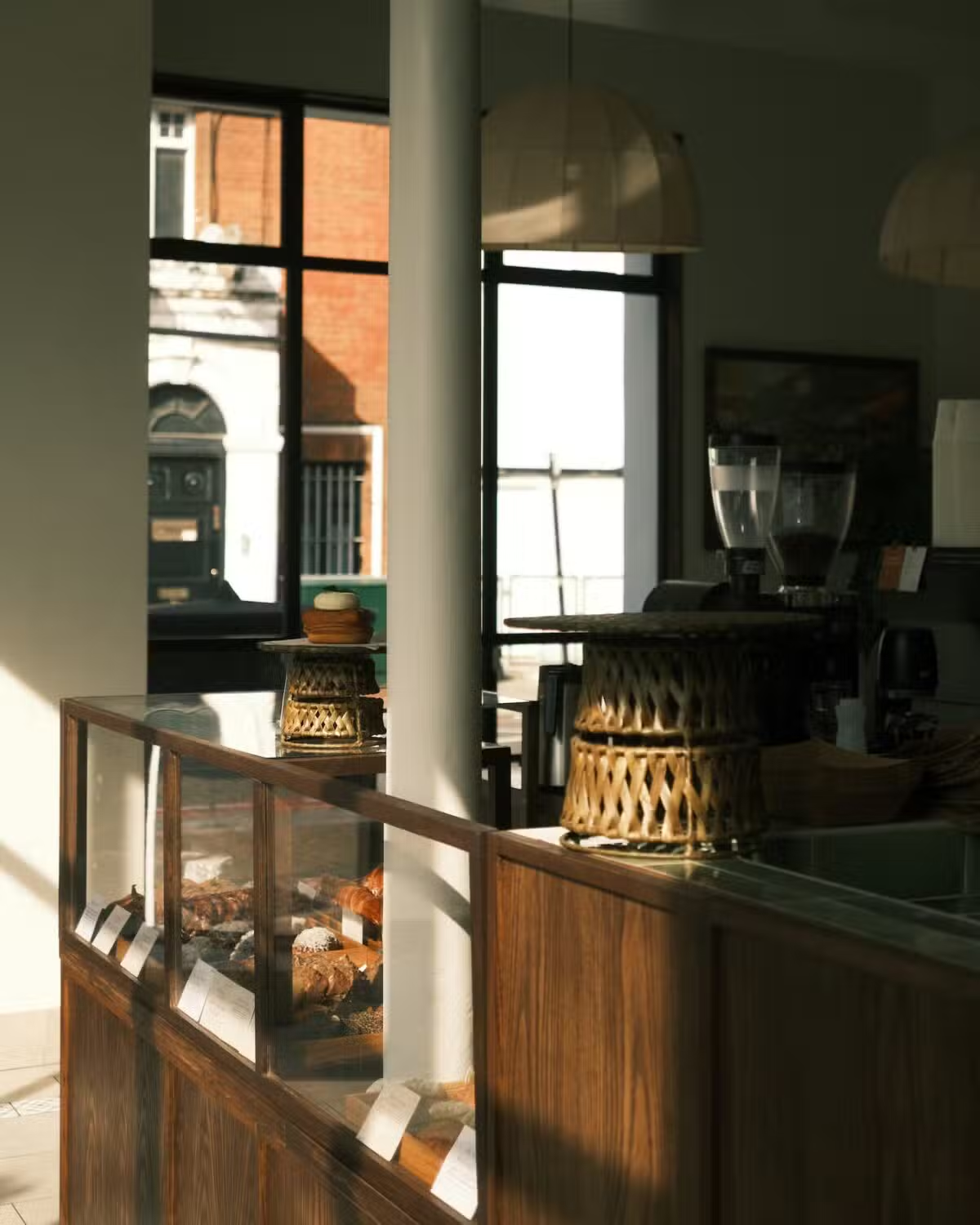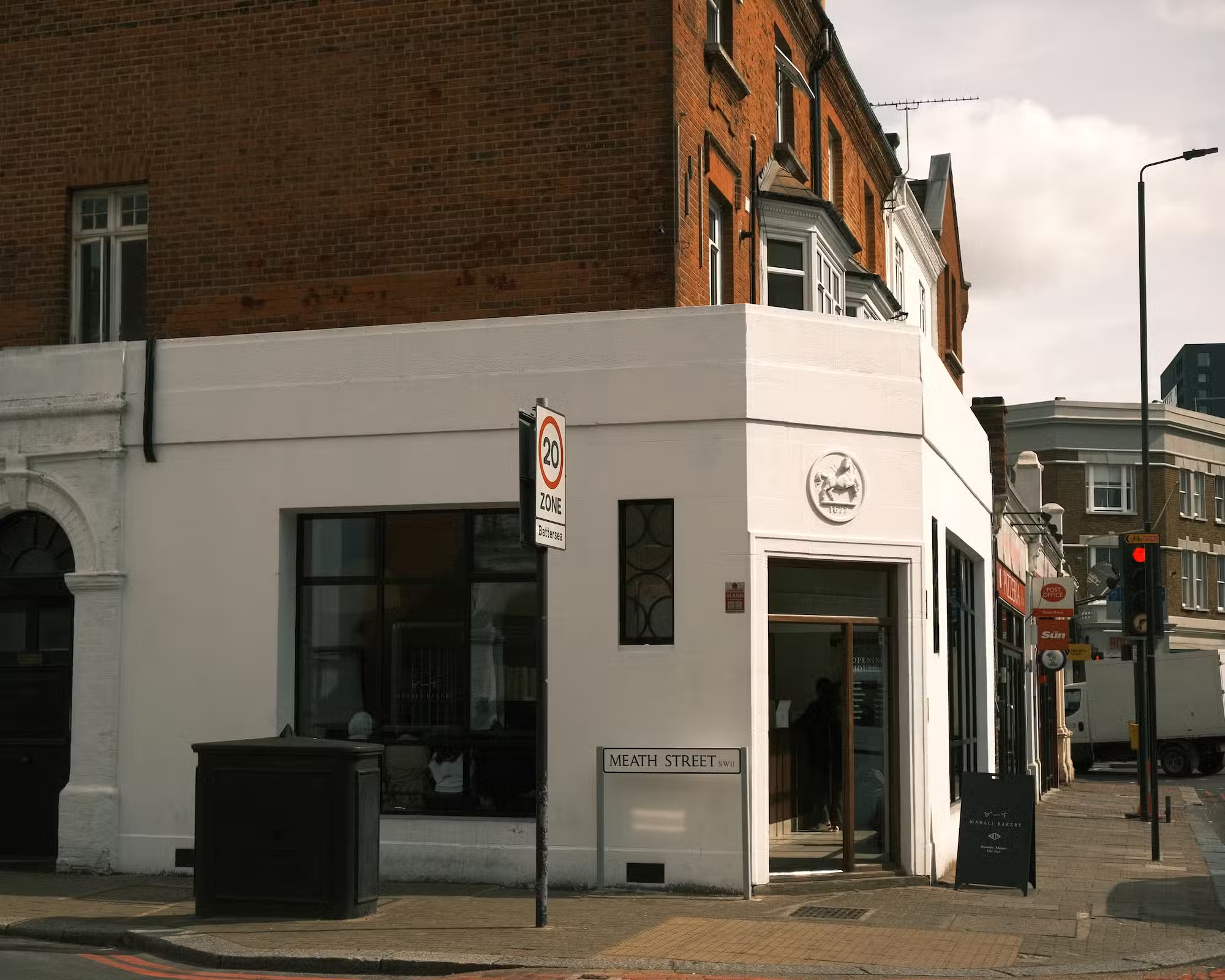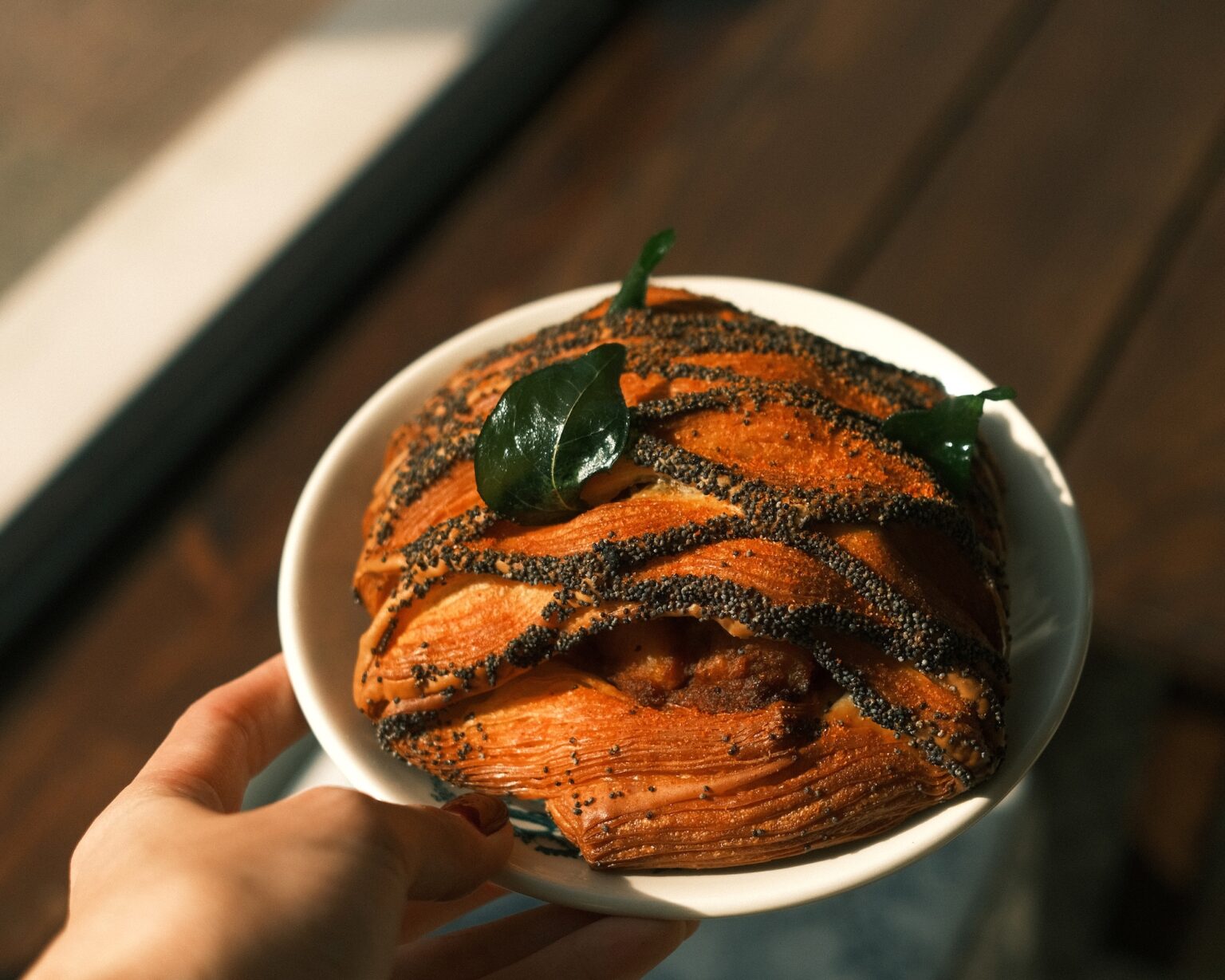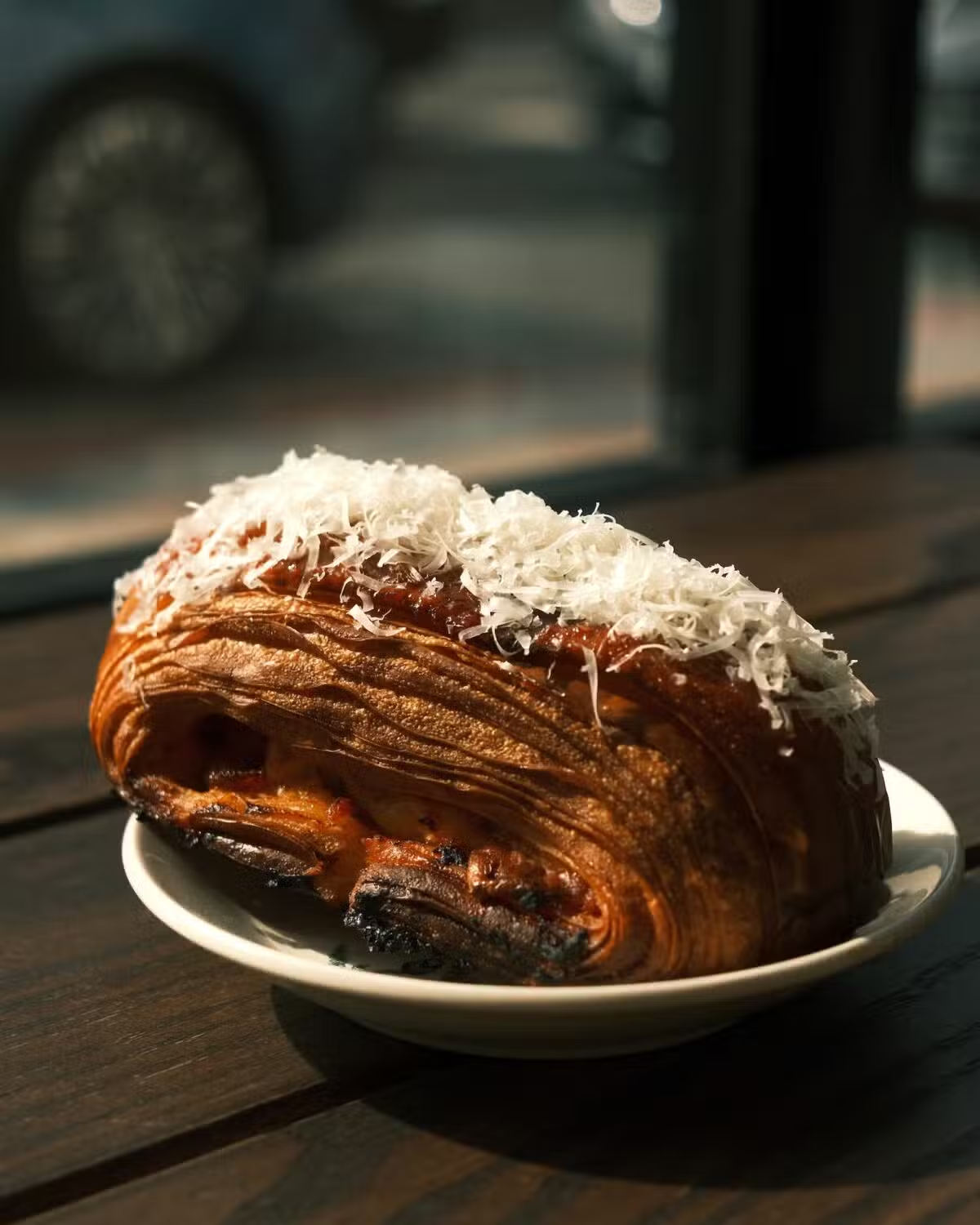September 10, 2025
LONDON – In Battersea, a riverside district just south of the Thames, Mahali Bakery offers a quiet pause amid the rush of traffic and shuffle of pedestrians. Step inside and the city recedes: sunlight spills across trays of freshly baked pastries, the aroma of butter and spice mingling with soft conversation. Behind the open counter, the rhythm of whisking and kneading fills the space with an easy warmth.
Mahali Bakery was founded by husband-and-wife duo Miguel Jocson and Ru-Yan Foong, classically-trained pastry chefs who set out to build something they could call their own. Though it took years of discipline and conviction to bring that vision into focus, they held on to a shared goal: to explore the breadth of Asian flavors through the delicate craft of pastry, blending tradition with invention in ways both surprising and deeply comforting. With Jocson’s Filipino roots and Foong’s Malaysian Chinese heritage, the pair drew on their backgrounds, allowing the flavors of home to fold naturally into their work.
Both attended Le Cordon Bleu in Sydney—though not at the same time—before pursuing their respective careers. Foong refined her approach in some of Singapore’s more progressive kitchens before returning to Australia, while Jocson honed his skills in fine dining, eventually becoming head of pastry at the Langham Hotel.

Mahali Bakery’s menu spans both sweet and savory.
The long road to Battersea
From the outset, their intention was to open a bakery. But like many independent ventures, their journey was anything but linear. Newly engaged and looking to start afresh, they packed up their lives in Sydney and moved to London. “I’ve always felt a strong connection to the city,” says Foong, whose ties to the capital date back to her university days. “People are always on the move,” she adds—an energy both she and Jocson identified with.
Even so, their excitement was tempered by a clear sense of the challenges ahead. Brexit was in full swing, casting uncertainty over an already difficult time for immigrants in their position—and then came the pandemic.
With landlords turning down their proposals one after another, arguing that newcomers posed too much of a risk, the pair set aside their plans for a bakery and considered an alternative way forward. To stave off restlessness, they took on orders from industry friends, turning out wholesale batches of carrot cakes and banana bread.

Mahali Bakery’s Miguel Jocson
Soon, their flat in central London became unrecognizable, transformed into a makeshift commissary that smelled overwhelmingly of butter. “It demanded a different kind of hustle,” says Jocson, recalling how he and Foong shifted between roles to keep things running. A growing roster of clients—from specialty coffee shops to brunch spots—eventually formed the foundation of a wholesale business that continues to thrive today.
In parallel, they pressed on with their search for a bakery space. Their breakthrough came when a former bank property in Battersea appeared on the market. Looking back, Foong says the most trying aspect of building Mahali went beyond the work itself: it was the elusiveness of it all—the constant pivots, the inevitable dead ends. “It felt as if we had been chasing this dream for the better part of three years,” she says.
So when the opportunity finally came around, they could scarcely believe it. In November 2024, with newfound resolve, they opened Mahali’s doors to the London public.

Subtle Southeast Asian motifs in the interiors
Love, in translation
The name Mahali has an unexpectedly tender origin: It derives from the Filipino term of endearment mahal, meaning “my love.” Jocson first put his own twist on the word as a joke, teasing Foong with it affectionately. Before long, the nickname stuck—friends and family began referring to them as “the Mahalis,” and even their suppliers followed suit.
That spirit carried into the bakery’s look and feel, where Jocson and Foong leaned heavily on Southeast Asian motifs. At one point, they considered incorporating baybayin, the indigenous script of the Philippines. This subtle nod to heritage was something they were both keen to adopt—and for Jocson, it doubled as a way to reclaim his identity, making space for his culture in a city defined by its diversity.

Mahali Bakery storefront.

The name derives from the Filipino term of endearment mahal, meaning “my love.”
Between layers of nostalgia
For Jocson and Foong, finding meaning in their creations has been an enduring motivation—a distinction they believed would resonate soundly with customers. “We’re always trying to recreate what’s personal to us,” says Foong. Often, that meant revisiting lived experiences and translating fragments of memory into viennoiserie. “We would ask ourselves, what kinds of flavors do we miss from back home?” she recalls.
Mahali’s menu spans both sweet and savory—a balance of classics and signatures that honors traditional technique while showcasing their flair for invention. On the sweet side, the Milo pastry, pandan almond croissant, and kaffir lime and pineapple are notable highlights. With their penchant for nostalgia, the Milo pastry reimagines the beloved drink as a layered indulgence. Inside, a flourless chocolate cake is piped with Milo cream, then finished with dark chocolate ganache and a crisp Milo sablé.

Kaffir lime and pineapple
Meanwhile, the pandan almond croissant draws on distinctly Southeast Asian influences. Their embrace of kaya—a coconut-based jam often infused with pandan leaves—stemmed from a desire to introduce something less familiar to the UK. Double-baked with a filling of kaya cream and almond frangipane, the croissant delivers a bite that’s buttery and textured, its sweetness carefully restrained.
In celebration of Chinese New Year, the kaffir lime and pineapple pastry debuted as a riff on the classic pineapple tart. This confection is brightened with kaffir lime leaves, lending an aromatic, citrusy lift. Though more commonly used in savory cooking, especially curries, the leaves here round out the fruit’s natural tartness while adding a delicate layer of nuance. Initially intended as a seasonal special, it drew such a positive response that the team decided to make it a regular feature.
Punch meets polish

Curry puff
When asked to describe his culinary style, Jocson frames it as a constant tension between flavor and finesse. “I like things to be punchy—enough to make a statement,” he explains. While flavor may take precedence, he is equally deliberate in applying years of hard-earned technique. “Miguel is a wizard with condiments,” says Foong. “He has a real gift for balance.”
To complement this, she gravitates toward a more rustic approach, letting the natural colors and textures of their ingredients shine through. Paired with their insistence on preparing everything in-house, this sensibility imparts their pastries with a refined simplicity.
A sense of home, in bread and butter
Even with their strong grounding in the basics, Mahali quickly became known among locals for its hearty pastries. Chief among them is the sambal bacon—a reimagining of the quintessential ham-and-cheese, and their bestselling pastry to date. “It was through sambal that we could really make this combination our own,” says Jocson.

Sambal bacon
He developed the condiment with both their cultures in mind, blending tamarind concentrate, red chillies, and shrimp paste. A final touch comes in the form of a warm honey glaze inspired by bakwa—a smoky, savory-sweet dried meat popular in Singapore and Malaysia.
For Foong, the curry puff holds a deeply personal place. It’s an homage to her mother—the person she credits with nurturing her love for baking. “She’s been making us curry puffs since we were young, and I knew I wanted to recreate it with croissant dough,” she recalls. For this version, they took care to source the right curry paste, ensuring it stayed as authentic as possible.
Beyond technique: pastry as identity
As they immersed themselves in the creative process, Jocson and Foong came to see pastry not just as technique but also as identity. “At first, not everyone could visualize what we were trying to do,” shares Foong. Despite concerns about being too niche, they stayed the course, convinced they had something genuine to offer. “What matters is that it makes sense to us,” says Jocson, noting how easy it is to get swept up in the chorus of voices around them.
Today, Mahali stands as an expression of that tireless dedication. At every step, their guiding principle remains disarmingly simple: trust your palate, and let the pastry speak for itself.


